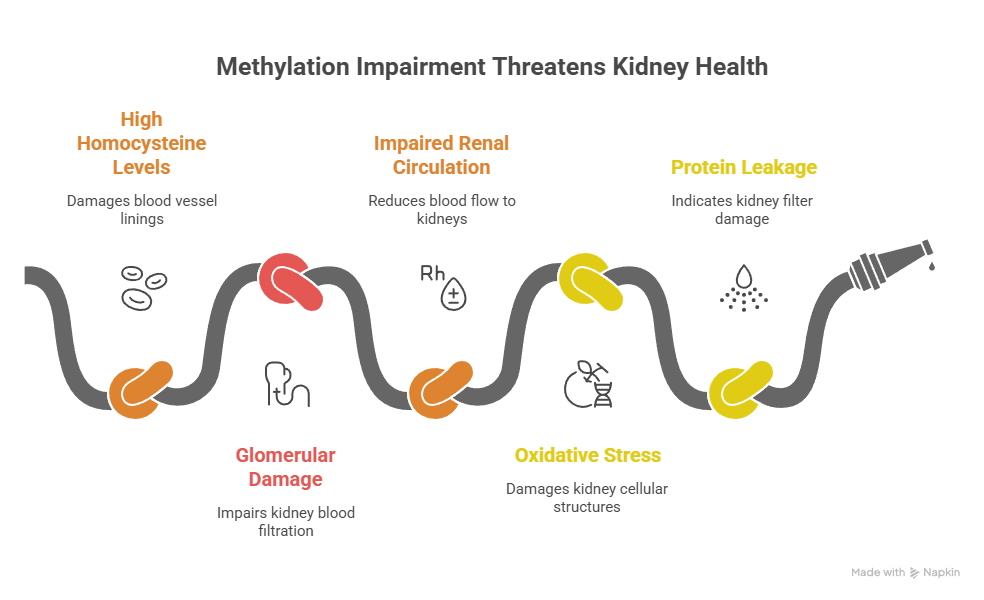.png)
When we talk about kidney disease and autoimmune conditions, the conversation often revolves around inflammation, diet, medications, or family history. But what if a seemingly small genetic variation was silently influencing your body’s ability to heal, detoxify, and regulate your immune system?
What if the key to better health lies in a biochemical process you’ve likely never heard of, but use billions of times a day?
Welcome to the world of MTHFR and methylation, a topic that is gaining attention not just in the functional medicine community but in patient journeys that are finally finding answers to long-standing health mysteries.
In a transformative episode of Wellness Focused, Dr. Bismah Irfan, MD, explores how this often-overlooked gene variation can have a ripple effect across the body, especially when it comes to kidney function and autoimmune balance. She explains the science behind methylation in accessible terms and reveals how supporting this essential process may unlock healing in ways conventional medicine doesn’t always explore.
At Kidney Institute, this understanding forms part of a broader holistic kidney care approach—addressing root causes like methylation imbalance to protect kidney function, lower inflammation, and restore whole-body wellness.
This blog unpacks the role of methylation, why MTHFR matters, and how functional medicine can provide practical solutions tailored to your unique biology.
What Is Methylation and Why Is It So Important?
Methylation is a fundamental biochemical process that happens in every cell, every second of every day. At its core, methylation involves the transfer of a small chemical group called a “methyl group” onto other molecules. While it may sound simple, the effects of this process are anything but.
Methylation is responsible for:
- Detoxifying harmful substances
- Repairing and expressing DNA
- Regulating immune responses
- Producing neurotransmitters like serotonin and dopamine
- Supporting the breakdown of hormones
- Keeping inflammation in check
If methylation is sluggish, impaired, or overwhelmed, it can throw multiple systems in the body off balance. Toxins may build up, inflammation can go unchecked, and your immune system may either weaken or become overactive.
For individuals with kidney disease or autoimmune disorders, this can be a silent but powerful underlying factor—one that must be addressed in holistic kidney care plans to prevent further organ stress.
Meet MTHFR: The Gene That Shapes Your Methylation Capacity
The MTHFR gene is one of the most well-known genetic variations in the realm of functional medicine, not because it causes disease directly, but because it impacts how well your body performs methylation.
MTHFR stands for methylenetetrahydrofolate reductase, a long name for a gene that plays a critical role in processing folate into its active form. This active form is necessary for producing methyl groups, which are the backbone of methylation.
When someone has a variation (or “mutation”) in the MTHFR gene, their ability to create and utilize methyl groups can be reduced. The two most common MTHFR variations are known as C677T and A1298C. Depending on whether you inherit one or two copies, your methylation efficiency can drop by 20 to 70 percent.
What does this mean in real life?
It means your body may have trouble:
- Converting folic acid or dietary folate into usable form
- Breaking down homocysteine, a harmful amino acid linked to heart and kidney damage
- Managing inflammation properly
- Producing enough serotonin and dopamine to regulate mood
- Detoxifying heavy metals, chemicals, and hormones
- Controlling autoimmune responses that lead to tissue damage
For someone already dealing with kidney stress or autoimmune symptoms, MTHFR-related methylation challenges can be the hidden fuel behind the fire—making holistic kidney care that addresses these biochemical roadblocks even more crucial.
Methylation and Kidney Health: A Silent Connection
Kidney health relies heavily on detoxification, blood vessel integrity, and inflammation control. All of these are influenced by methylation.
One of the most significant connections lies in homocysteine metabolism. When methylation is impaired, homocysteine can build up in the blood. High homocysteine levels are toxic to the lining of blood vessels and can contribute to:
- Glomerular damage (where the kidney filters blood)
- Impaired renal circulation
- Oxidative stress
- Protein leakage in the urine
These changes may not be noticeable at first but can gradually contribute to the progression of chronic kidney disease.
Methylation also helps manage the balance between immune tolerance and immune activation. When this balance is lost, the body may begin attacking its own tissues, including delicate kidney structures, as seen in autoimmune kidney conditions like lupus nephritis or IgA nephropathy.
This is where the holistic kidney care model at drbismah.com Kidney Institute shines—integrating genetic insights, detox support, and inflammation reduction into patient care to protect kidney tissue and promote long-term resilience.

Final Thoughts
If you’ve been struggling with chronic kidney issues, unexplained inflammation, or autoimmune symptoms, it may be time to explore the deeper layers of your health story.
The MTHFR gene and the methylation pathway are not fringe science. They are fundamental processes that touch every system in the body, and for some, they may be the key to turning the tide on persistent symptoms.
Dr. Bismah Irfan’s integrative approach at Kidney Institute reminds us that our bodies are not broken. They are beautifully complex, adaptable, and wise. By identifying the missing pieces, supporting methylation, and reducing internal stressors, holistic kidney care makes healing not just possible—but inevitable.
Special Offer: Take $50 off your first visit and discover how personalized, root-cause medicine can transform your health.
